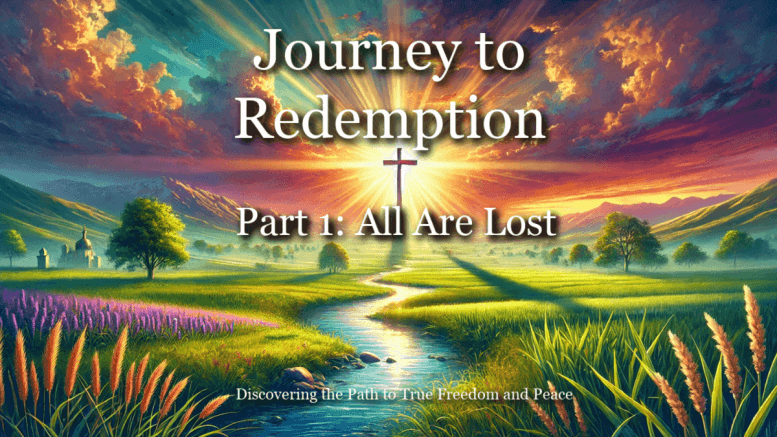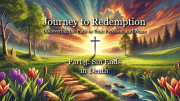We began by acknowledging our spiritual lostness and the divine provision of salvation through Christ, who bore our iniquities. Scripture: “All we like sheep have gone astray; we have turned—every one—to his own way; and the Lord has laid on him the iniquity of us all.” (Isaiah 53:6, ESV)
In this first part of our ‘Journey to Redemption‘ series, we explore the biblical truth that all humanity is lost without salvation.
Journey to Redemption: All Are Lost (Isaiah 53:6)
Welcome to part 1 of our 6-part series on Salvation, and the journey to redemption. In this series, we delve into the profound truths of God’s redemptive plan for humanity as revealed in God’s Word.
Each part of this series will explore a key aspect of salvation. We aim to illuminate the path from our lost state to the glorious hope we have in Christ. The Bible, God’s infallible Word, clearly outlines the journey of salvation. It emphasizes the universal need for redemption and the incredible love of God in providing a Savior. Whether you are seeking a deeper understanding of your faith or exploring the foundations of Christianity, this series aims to provide clarity and encouragement.
Bible Verse: Isaiah 53:6
“All we like sheep have gone astray; we have turned every one to his own way; and the LORD hath laid on him the iniquity of us all.”
Our Tendency to Wander on our Journey to Redemption
Isaiah 53:6 paints a vivid picture of humanity’s spiritual condition: “All we like sheep have gone astray; we have turned every one to his own way; and the LORD hath laid on him the iniquity of us all.” This verse highlights our propensity to stray from God’s path. It also points to the sacrificial work of Christ, who bore our sins.
Isaiah uses the metaphor of sheep to describe our tendency to wander. Just as sheep are prone to stray from their shepherd, we too have turned away from God. The Bible consistently portrays this theme of wandering and disobedience. For example, in Psalm 119:176, the psalmist writes, “I have gone astray like a lost sheep; seek thy servant; for I do not forget thy commandments.” This acknowledgment of straying emphasizes our need for divine guidance and intervention.
The Universality of Sin
Matthew Henry’s Commentary elaborates on this imagery. He states, “We have all turned to our own devices and desires, following our own ways rather than God’s.” This turning away is not just a passive drifting but an active choice to pursue our own paths. This choice leads us further from God’s righteousness.
The New Testament echoes this theme of universal lostness. Romans 3:10-12 declares, “As it is written, There is none righteous, no, not one: There is none that understandeth, there is none that seeketh after God. They are all gone out of the way, they are together become unprofitable; there is none that doeth good, no, not one.” Paul emphasizes the comprehensive nature of sin, affecting every individual without exception. Our natural inclination is to deviate from God’s standards.
The Divine Solution
Despite our waywardness, there is hope. The latter part of Isaiah 53:6 reveals the divine solution: “the LORD hath laid on him the iniquity of us all.” This prophetic statement points to Jesus Christ, the Suffering Servant, who would bear the sins of humanity. In the New Testament, this is fulfilled in Jesus’ sacrificial death on the cross. 1 Peter 2:24 affirms, “Who his own self bare our sins in his own body on the tree, that we, being dead to sins, should live unto righteousness: by whose stripes ye were healed.”
John Gill’s Exposition of the Bible provides insight into this profound act of atonement. Gill explains that Christ’s bearing of our iniquities was a voluntary and redemptive act. He bore the punishment we deserved, satisfying divine justice and offering us reconciliation with God. This underscores the magnitude of Christ’s love and the depth of our need for His redemptive work.
A Call to Return
Furthermore, Isaiah 53:6 urges us to recognize our own lostness and turn back to God. Additionally, the parable of the lost sheep in Luke 15:3-7 illustrates God’s relentless pursuit of the lost. Jesus asks,
“What man of you, having an hundred sheep, if he lose one of them, doth not leave the ninety and nine in the wilderness, and go after that which is lost, until he find it?”
This parable highlights God’s compassionate heart and His desire to restore those who have strayed.
Moreover, the hope of salvation extends to all who ask God for it in the Biblical manner. Romans 10:9 assures us,
“That if thou shalt confess with thy mouth the Lord Jesus, and shalt believe in thine heart that God hath raised him from the dead, thou shalt be saved.”
This promise testifies to God’s readiness to forgive and restore anyone who seeks Him with a sincere heart. As we journey through this series, let us remember that salvation is not earned. Instead, it is given freely by grace through faith in Jesus Christ.
Conclusion
In conclusion, Isaiah 53:6 encapsulates the human condition of spiritual lostness and the divine provision of salvation through Christ. We, like sheep, have gone astray, but God in His infinite mercy laid our iniquities on Jesus. This sacrificial act offers us the opportunity to return to the Shepherd and experience the fullness of His grace and forgiveness. Let us acknowledge our need for Him, embrace His redemptive work, and walk in the righteousness He provides.
For further reading:
1. GotQuestions.org – What does it mean that all have sinned? [GotQuestions.org – All Have Sinned]
2. Desiring God – Why We All Need Salvation [Desiring God – Why We All Need Salvation]





